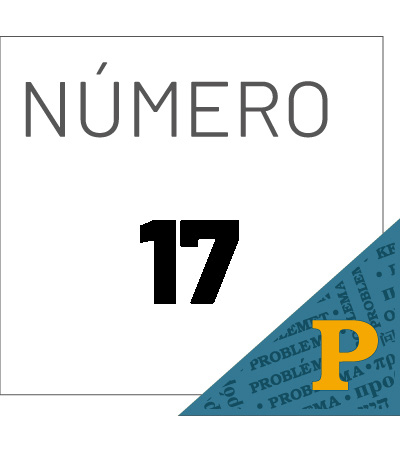Jürgen Habermas. Baedeker of his Legal Proposal
Habermas has developed a legal Theory based on his communicative action philosophy. Without moving away from the traditional foundations that sustain the Rule of Law, he has innovated a position of legitimation of the law and its exercise, even offering new conceptual tools for the judicial function as it's the case with what could be called the adequacy that replaces to the well-known proposal for the weighing of rights. This article aims to serve as a guide to get inside the territory of his discursive proposal.
Article Details
Use of Creative Commons (CC) licences
All texts published by Problema. Anuario de Filosofía y Teoría del Derecho, without exception, are distributed under the CC-BY-NC-ND 4.0 International licence, which allows third parties to use what is published, as long as they mention the authorship of the work and the first publication in this Anuario.
Accessibility to articles and other publications in whole or in part under the concept of copying, distribution, public communication, interactive access (via the Internet or other means), while explicitly acknowledging the author(s) and the journal itself (acknowledgement of authorship).
Please note that if articles are remixed, modified or fragments are used in other creations, the modified material may not be distributed, nor may versions be reconstructed from the original published articles (derivative works).
The use of the contents of the published articles, in whole or in part, for profit-making purposes (non-commercial acknowledgement) is prohibited.
See https://creativecommons.org/licenses/by-nc-nd/4.0/

This work is licensed under a Creative Commons Attribution-NonCommercial 4.0 International License.
References
Alexy, R. (1989). Teoría de la argumentación jurídica. Centro de Estudios Constitucionales.
Alexy, R. (2011). Sobre la estructura de los derechos fundamentales de protección. La teoría principilista de los derechos fundamentales (pp. 119-135). Marcial Pons.
Aliste Santos, T. J. (2018). La motivación de las resoluciones judiciales. Marcial Pons.
Almagiá, E. B. (1987). El desarrollo moral: una introducción a la teoría de Kohlberg. Revista Latinoamericana de Psicología, 19(1), 7-18.
Arroyo, J. C. V. (2000). La teoría discursiva del derecho. Sistema jurídico y democracia en Habermas.
Arroyo, J. C. V. (2003). Para leer a Habermas. Alianza. https://dialnet.unirioja.es/servlet/libro?codigo=112811
Barak, A. (2017). Proporcionalidad. Palestra.
Behabib, S. (2004). Los derechos de los otros. Gedisa.
Brennan, Jason. (s. f.). El mundo está encaminado a hacerse más liberal. Átomo. Consultado el 13 de mayo de 2021. https://www.revistaatomo.com/es/2019/11/jason-brennan-el-mundo-esta-encaminado-a-hacerse-mas-liberal/
Brudner, A. (2007). Constitutional Goods. Oxford University Press. https://doi.org/10.1093/acprof:oso/9780199225798.001.0001
Castro Sáez, B. (2011). Aportes de Niklas Luhmann a la teoría de la complejidad. Polis. Revista Latinoamericana, 29, 29. http://journals.openedition.org/polis/2017
Cohen, J. L. (2012). Sociedad civil y teoría política.
Comanducci, P. (2005). Formas de (neo)constitucionalismo: un análisis metateórico. En M. Carbonell (ed.), Neoconstitucionalismo (2a. ed., pp. 75-98). Trotta.
Dworkin, R. (2002). Los derechos en serio. Ariel.
Dworkin, R. (2007). La justicia con toga. Marcial Pons.
García Amado, J. A. (1993). La filosofía del derecho de Jürgen Habermas. Doxa. Cuadernos de Filosofía del Derecho, 13, 235. https://doi.org/10.14198/DOXA1993.13.12
Habermas, J. (1989). El discurso filosófico de la modernidad. Tecnos.
Habermas, J. (1997). Teoría de la acción comunicativa: complementos y estudios previos. Cátedra.
Habermas, J. (2000). Aclaraciones a la ética del discurso. Trotta.
Habermas, J. (2002). Verdad y justificación. Trotta.
Habermas, J. (2003). Teoría de la acción comunicativa II. Taurus.
Habermas, J. (2004). Tiempo de transiciones. Trotta.
Habermas, J. (2005). Facticidad y validez. Trotta.
Jiménez, M. (2005). Introducción a facticidad y validez. Facticidad y Validez (pp. 9-55). Trotta.
Krause, S. R. (2008). Civil Passions: Moral Sentiment and Democratic Deliberation. Princeton University Press. https://www.jstor.org/stable/j.ctt7snj3
Krebs, A. (1994). La ética feminista. Una crítica de la racionalidad discursiva. Areté, 6(2), 253-272.
Lübbe, H. (1990). Are Norms. Methodically Justifiable? A Reconstruction of Max Weber’s Reply. En S. Behabib (Ed.), The Communicative Ethics Controversy. MIT Press.
Luhmann, N. (1997). La clausura operacional de los sistemas psíquicos y sociales. En H. R. Fischer (ed.), El final de los grandes proyectos. Gedisa.
Martínez, D. (2011). Reformulación de la teoría del desarrollo moral de Kohlberg realizada por Habermas. Persona y Sociedad, 25(2), 2. https://doi.org/10.11565/pys.v25i2.212
McCarthy, T. (1987). La teoría crítica de Jürgen Habermas. Tecnos.
Moreno, R. (2014). ¿Se empieza reemplazar la ponderación en México? El mundo del abogado, 16(185), 53-56.
Müller-Doohm, S. (2020). Jürgen Habermas. Una biografía. Trotta.
Putnam, H. & Habermas, J. (2008). Normas y valores. Trotta.
Quintana, O. M. (1996). La teoría del derecho y la democracia en Jürgen Habermas: en torno a “Factizität und Geltung”. Ideas y valores, 46(103), 103.
Rawls, J. & Habermas, J. (1998). Introducción. Una disputa de familia: el debate Rawls-Habermas. Debate sobre el liberalismo político. Paidós.
Rodríguez, J. L. (2021). Teoría analítica del derecho. Marcial Pons.
Rosenfeld, M. (2004). Lo stato di diritto e la legittimità della democrazia costituzionale. 4, 36.
Sanchís, L. P. (2004). El constitucionalismo de los derechos. 26.
Schauer, F. (2004). Las reglas en juego. Marcial Pons.
Vega, J. & Gil, F. J. (2008). Pragmatismo, objetividad normativa y pluralismo, el debate sobre normas y valores entre H. Putnam y J. Habermas. Normas y valores (pp. 9-46). Trotta.
Waluchow, W. (2009). Una teoría del control judicial de constitucionalidad basada en el Common Law. Marcial Pons.



























